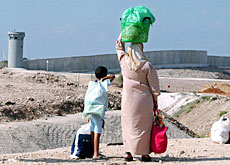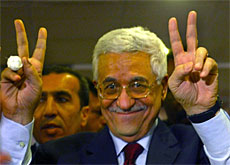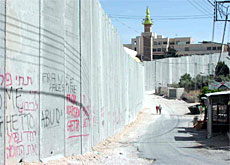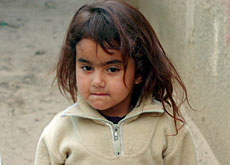Palestinians hope for better lives

With peace a distant prospect, Palestinians are still waiting for a better life, according to the head of the Swiss cooperation office for Gaza and the West Bank.
swissinfo caught up with Mario Carera ahead of a visit to the region by the Swiss foreign minister, Micheline Calmy-Rey.
Calmy-Rey, who has been pushing the unofficial Geneva Accord as a solution to the conflict, is expected in Israel and the Occupied Territories this week.
Carera has been heading the Swiss Agency for Development and Cooperation (SDC) office in Jerusalem since late last year. He says the Palestinians’ biggest concern is getting their economy back on its feet.
swissinfo: What is the general feeling among the Palestinian population at this time?
Mario Carera: Now that the new president, Mahmoud Abbas, has been elected, and there are signs dialogue with Israelis may be possible, most of the population is hoping for an improvement in living conditions.
Since the beginning of the second Intifada [in autumn 2000], conditions have only worsened. Around one third of the population in the West Bank is unemployed, and half of the inhabitants of the Gaza Strip are out of a job.
People are hoping that checkpoints will be opened, that there will be fewer identity checks and that Israeli military operations will cease. Because they want to go back to Israel to work and get their own economy back on track.
swissinfo: How do the Palestinians live, or even survive?
M.C.: International aid to the Palestinians – about $1 billion (SFr1.19 billion) per year – represents around 30 to 40 per cent of their gross domestic product. It covers most of their budget for education, health and infrastructure.
The Palestinians also help each other out, either within their family circle or within regions. This solidarity helps keep local markets open for farmers, tradesmen and small and medium-sized companies.
One of the consequences of the Israeli occupation is that it divides the West Bank and makes it very difficult to get around. Given this division of the territory, the local economy has relied on Palestinian solidarity. This has also helped prevent people’s standard of living from dropping too dramatically.
swissinfo: During the second uprising, official aid from Switzerland has at times only gone to United Nations agencies working in the territories. Has direct aid to locals since resumed?
M.C.: Besides our humanitarian aid, which has increased since 2000, Switzerland has always cooperated with Palestinian partners. Much of this work also involves northern European countries such as Norway and Denmark.
We are running a programme to help former Palestinian detainees who were held in Israeli jails.
In Gaza, we have a mental health programme for thousands of families affected by the humanitarian and military situation. We work with a Palestinian foundation that also promotes humanitarian law.
In Ramallah, along with the Norwegians and the Dutch we support a human rights commission to defend citizens’ political and administrative rights. The Palestinian parliament is expected to debate a law this spring on giving legal status to the commission.
If the legislation is approved, the commission will be able to bring matters before the courts and will serve as a model for good governance and basic rights throughout the region.
swissinfo: How is the SDC helping the Palestinian economy get back on its feet?
M.C.: We are working with the Palestinian labour ministry to boost vocational training. In the territories, schools and universities are good, despite the disruptions caused by the conflict and the Israeli occupation.
But there are very few opportunities for apprenticeships. The programme we are supporting is aimed at setting up proper vocational training.
More than half the population is under the age of 20, so it is vital for those who do not attend university to get proper training to become technicians or tradesmen.
swissinfo: Is your work coordinated with other countries?
M.C.: The coordination and harmonisation of aid is one of our priorities. There are many countries and organisations involved, including the United States, the European Union and the UN.
We belong to a number of coordination groups, which allows us to run cooperation projects over a number of years.
We also plan to set up a coordination office for non-governmental organisations (NGOs). With the help of our northern European colleagues, we will open a single reference centre for Palestinian NGOs. We will be able to develop a common approach to all their questions, cut costs and improve the quality of our support.
swissinfo-interview: Frédéric Burnand
There are 3.6 million Palestinians in the occupied territories (Gaza Strip and West Bank).
These areas represent a total surface area of 5,879 square kilometres, or one sixth of Switzerland.
The gross domestic product was $3.1 billion in 2003.
In 2004, the SDC had a budget of SFr21.4 million for its activities in the occupied territories, including SFr10.7 million for humanitarian aid.
The SDC office in Jerusalem employs eight people, including five Palestinians.
Since November 2004, it has been headed by Mario Carera, a former advisor to Swiss transport minister Moritz Leuenberger.

In compliance with the JTI standards
More: SWI swissinfo.ch certified by the Journalism Trust Initiative




You can find an overview of ongoing debates with our journalists here. Please join us!
If you want to start a conversation about a topic raised in this article or want to report factual errors, email us at english@swissinfo.ch.